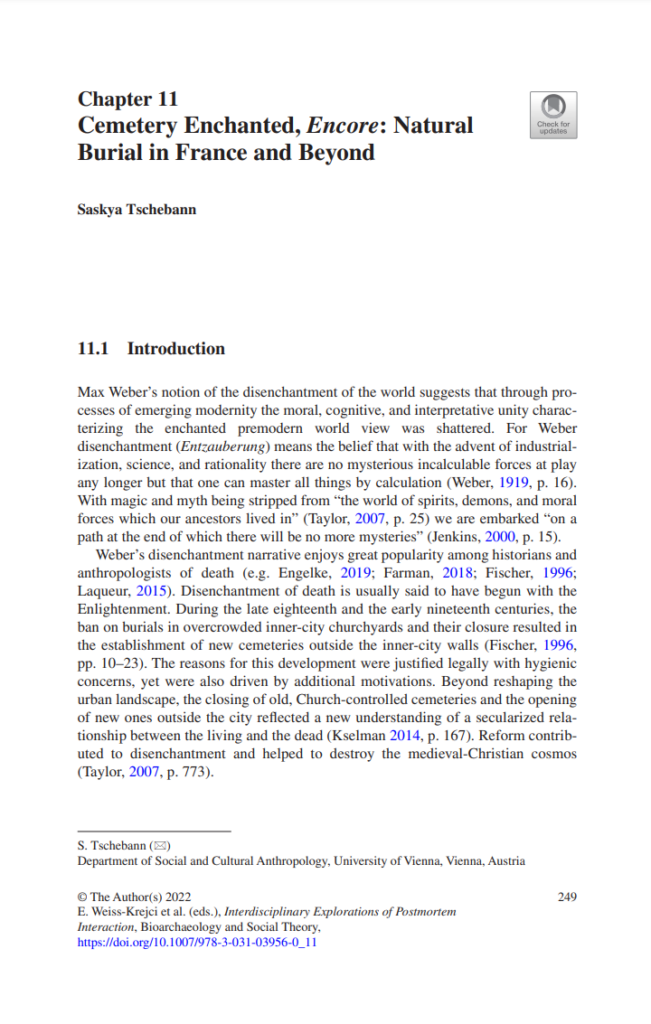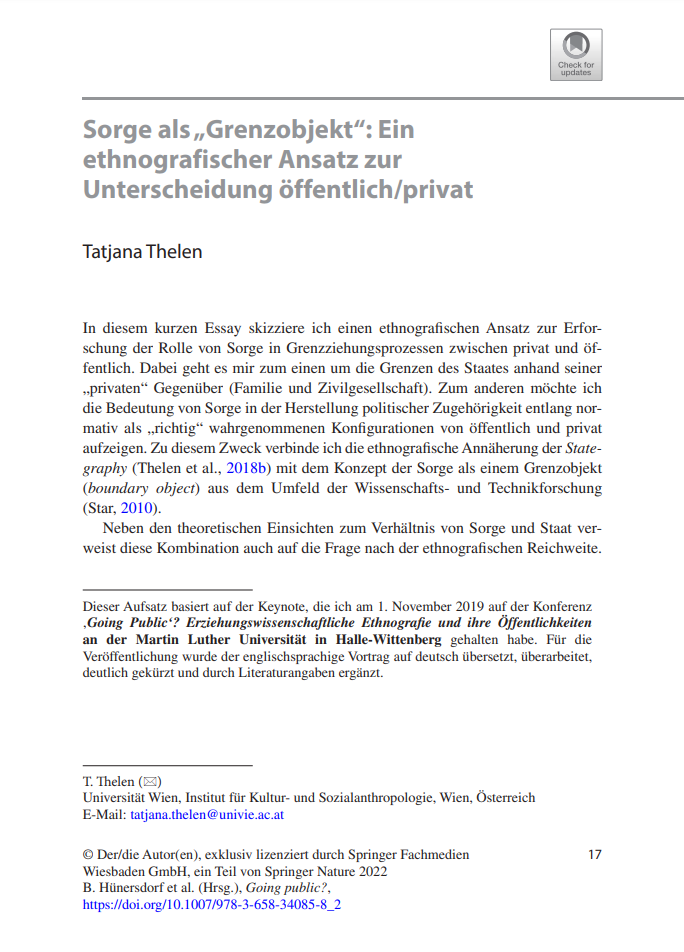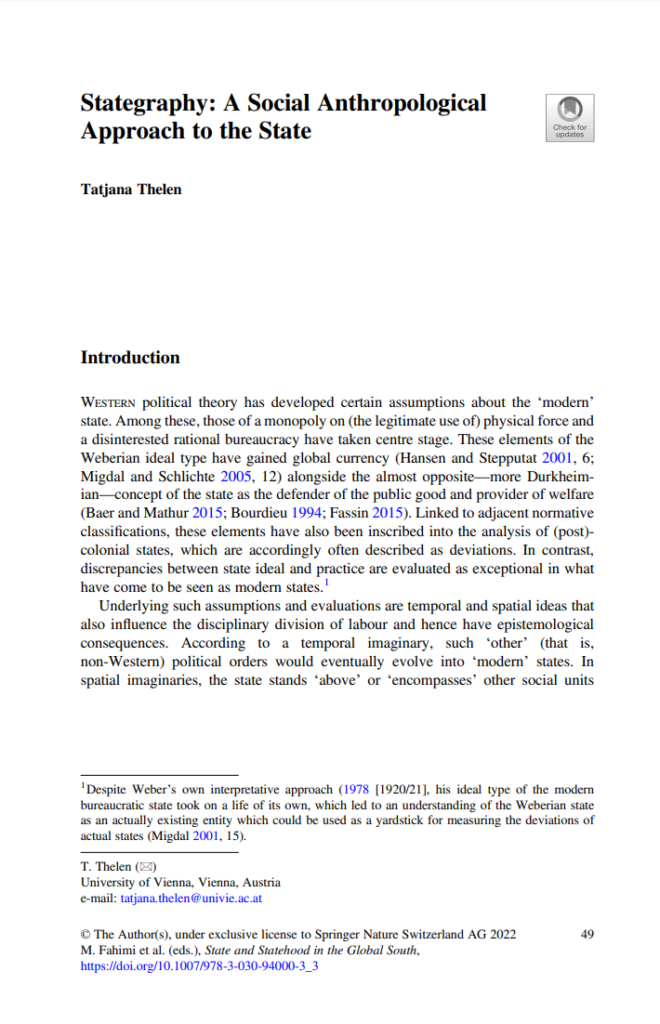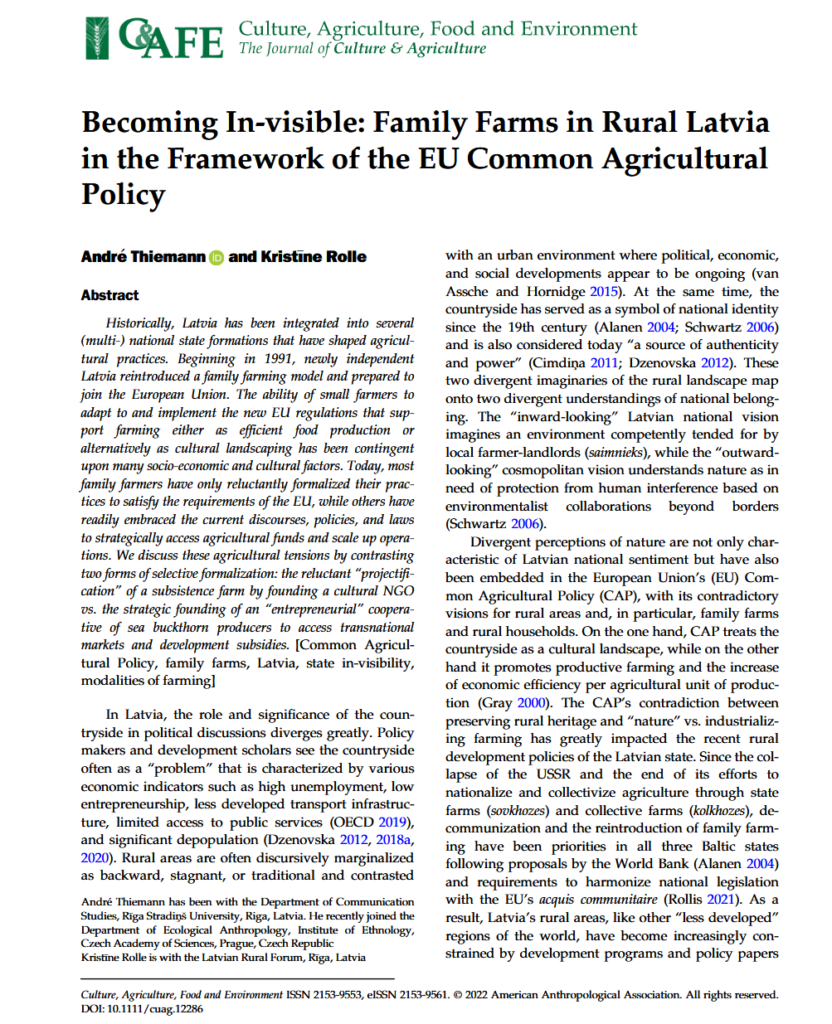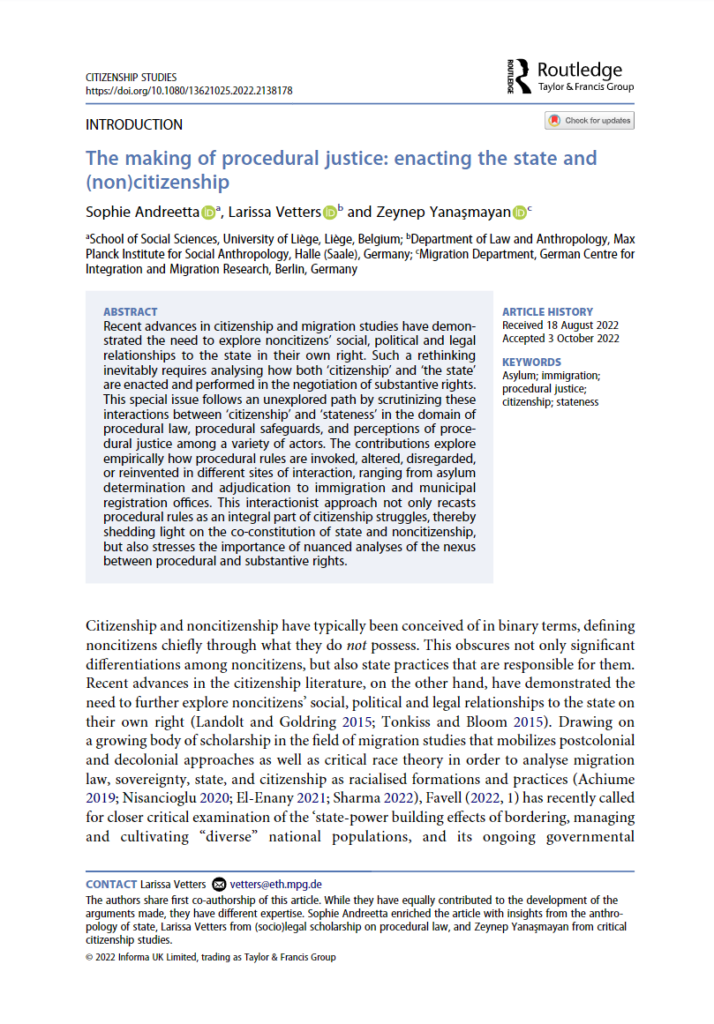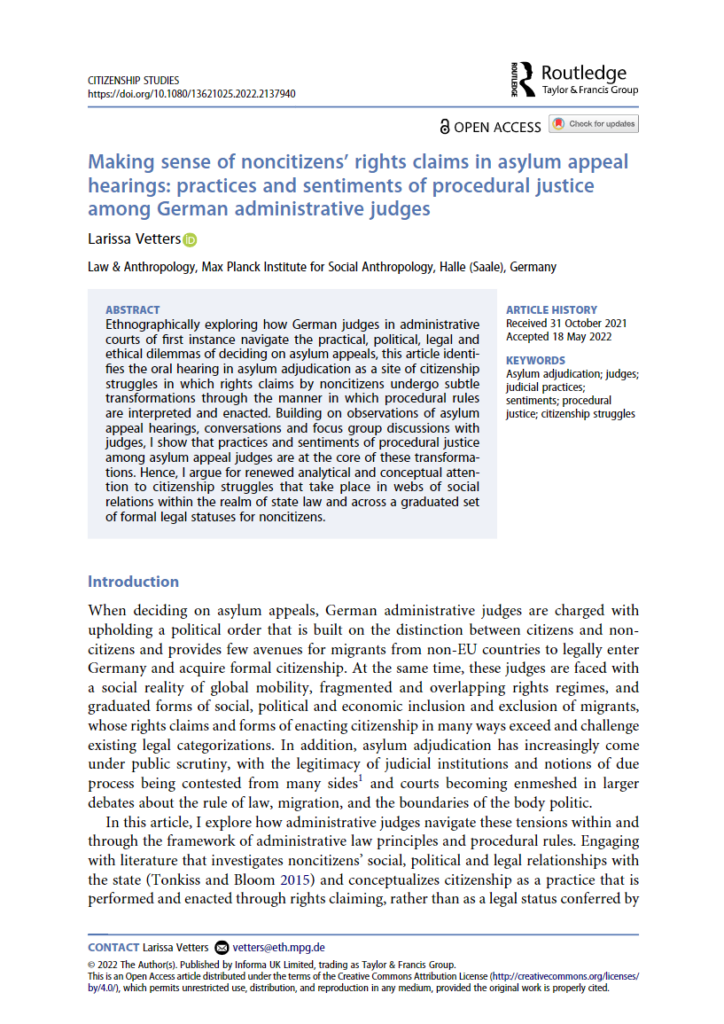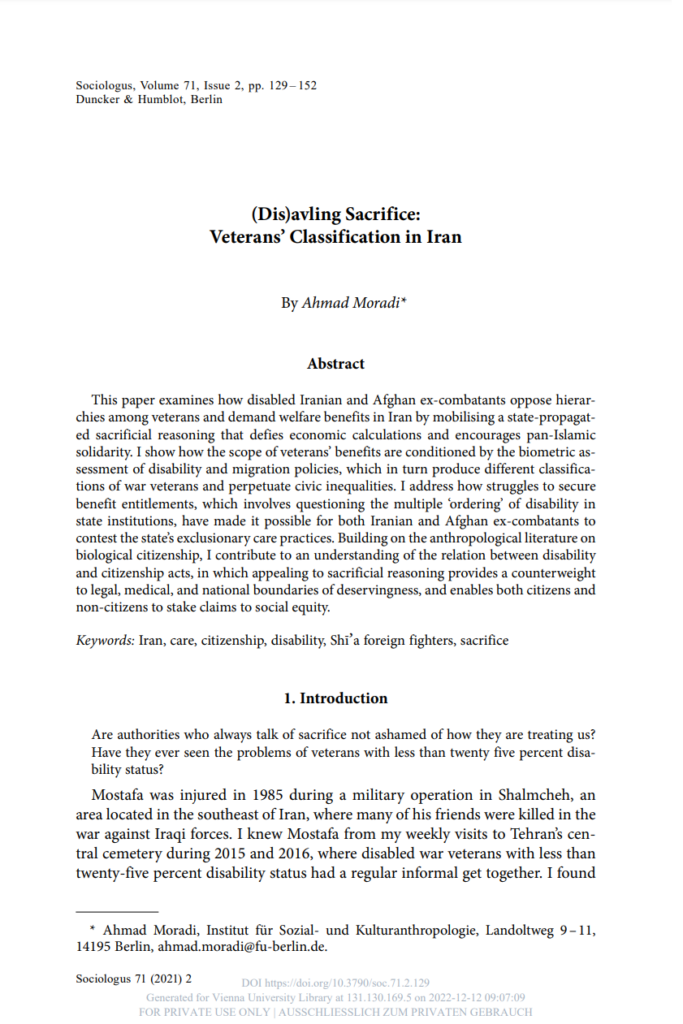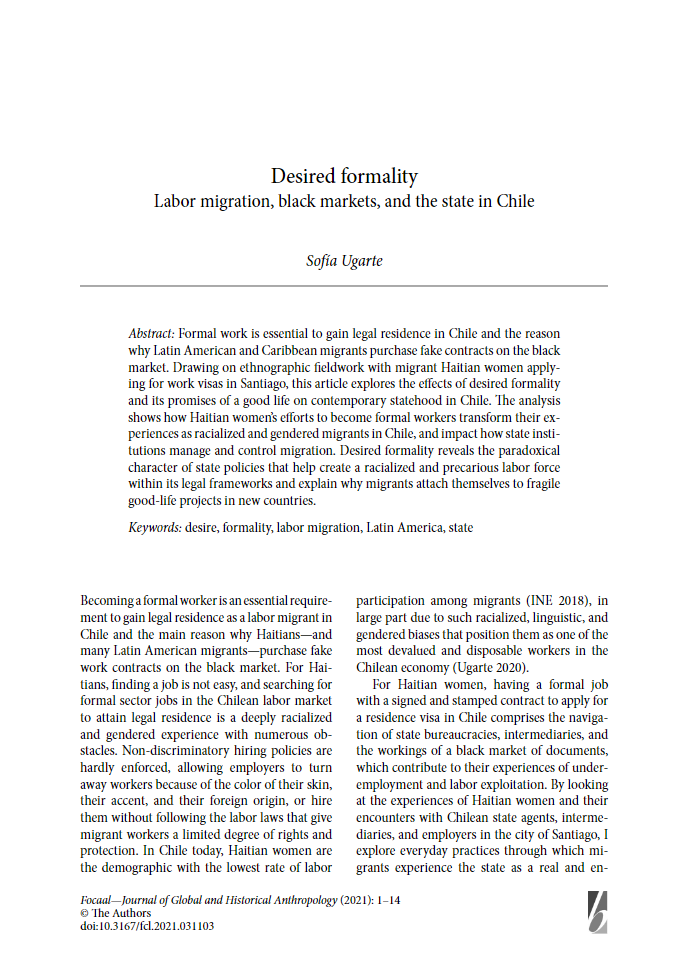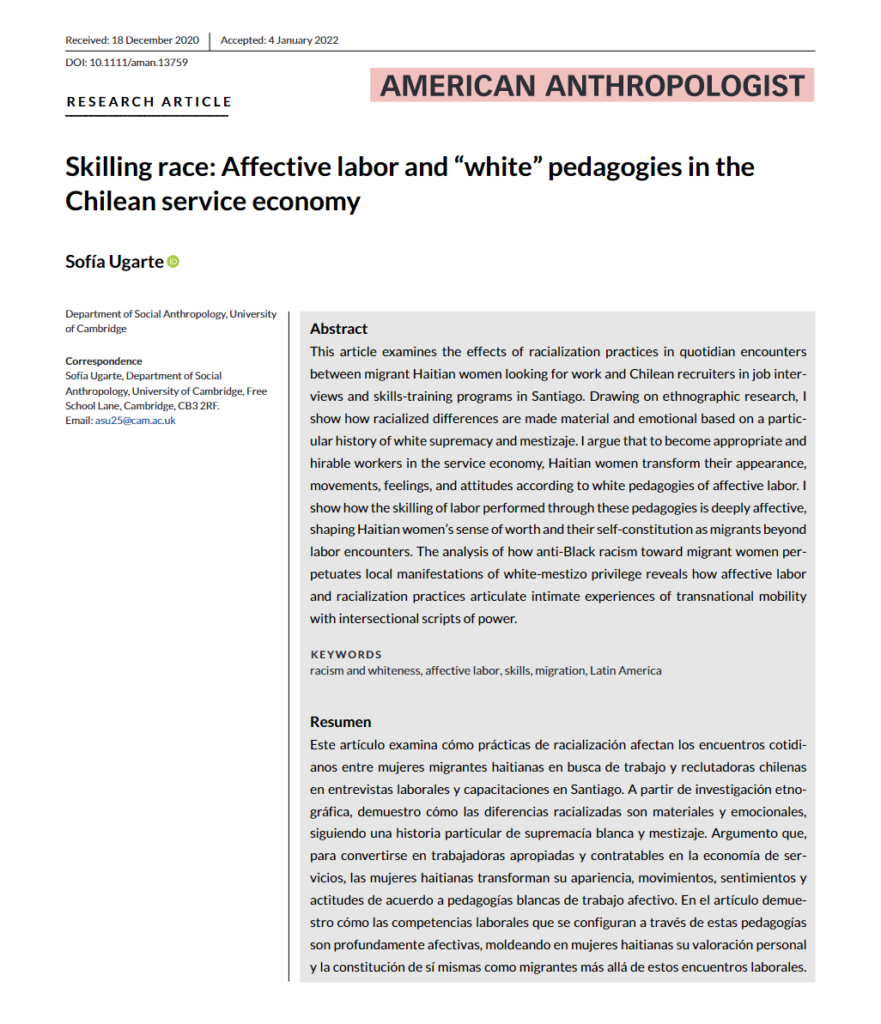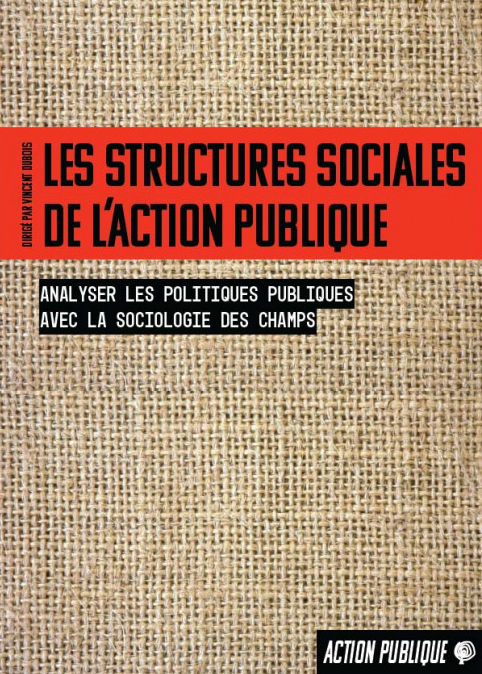
Dubois, Vincent (ed.): Les structures sociales de l’action publique. Analyser les politiques publiques avec la sociologie des champs.
Le Croquant, 2022.
Comprendre une politique publique, son orientation, son style, ses instruments, implique de reconstituer la structure des relations sociales qui la fondent. Parmi les différents outils permettant de réaliser un tel pro- gramme, la sociologie des champs de Pierre Bourdieu apparaît particulièrement féconde. Ce livre illustre la portée d’une telle analyse, rarement mobilisée en matière d’action publique, en la mettant en œuvre sur des objets très différents (politiques économiques, usages politiques de l’histoire, salubrité alimentaire, gestion de l’eau, politiques de l’Union européenne, etc.). Il rassemble des contributions de chercheurs du monde entier (Argentine, Brésil, Canada, États-Unis, France, Suisse) travaillant sur ces pays et d’autres encore (Chili, Pérou, Pologne, Roumanie). Cette recherche collective renouvelle ce faisant l’analyse des politiques qui affectent la vie des populations et régulent les sociétés contemporaines.
Tschebann, Saskya: Cemetery Enchanted, Encore. Natural Burial in France and Beyond.
In: Interdisciplinary Explorations of Postmortem Interaction. Bioarchaeology and Social Theory, edited by E. Weiss-Krejci, S. Becker and P. Schwyzer, 249–268.
Over the past three decades, a silent revolution in funerary practices and cemetery design known as the ‘natural burial movement’ has swept over various national contexts and created a transnational narrative that is embedded in local funerary cultures. Seeking out environmentally-friendly burial alternatives, new cemetery and commemoration concepts take into account the urban lack of space and changing family structures and combine these with a desire for autonomy from economically and ecologically costly burial practices. A salient feature of these new burial sites are their naturalistic design and enchanting appeal. Presenting ethnographic research at France’s first natural cemetery «Cimetière naturel de Souché», which opened in 2014, this chapter examines and reflects on the changes in material as well as immaterial funeral settings within a contemporary European context. The research reveals insights into a heterogenous set of values concerning human body disposal, nature and culture, gift giving and reciprocity, and purity and respect. The main objectives of the cemetery officials originally were geared towards the creation of a place as close to nature’s makeup as possible, a reduction of the ecological footprint of burials, and cost decrease. The most significant aspects for the bereaved and other visitors are, however, an appeal beyond economic and ecologic objectives. Spiritualities, therapeutic death contemplation, and continuous kin care point to an enduring enchantment: meditations veiled in a green hue.
Thelen, Tatjana: Sorge als ‘Grenzobjekt’. Ein ethnografischer Ansatz zur Unterscheidung öffentlich/privat.
In: Going public? Erziehungswissenschaftliche Ethnographie und ihre Öffentlichkeiten, edited by Bettina Hünersdorf, Georg Breidenstein, Jörg Dinkelaker, Oliver Schnoor and Tanya Tyagunova, 17–31.
Der Essay fokussiert auf die Trennung zwischen öffentlich und privat als empirisches Problem. Anhand von ethnografischen Beispielen wird einerseits die Grenzproduktion zwischen dem Staat und seinen „privaten“ Pendants – Familie und Zivilgesellschaft – illustriert und andererseits die Herstellung politischer Zugehörigkeit entlang von normativ als richtig wahrgenommenen Konfigurationen illustriert. In beiden Fällen wird Sorge zum Grenzobjekt. Dieser methodisch-theoretische Fokus weicht gleichzeitig das scheinbare Spannungsverhältnis zwischen der ethnografischen Empirie und größeren Öffentlichkeiten auf.
Thelen, Tatjana: Stategraphy. A Social Anthropological Approach to the State.
In: The State and Statehood in the Global South. Theoretical Approaches and Empirical Studies, edited by Miriam Fahimi, Elmar Flatschart and Wolfram Schaffar, 49–65.
In this chapter, I outline a social anthropological approach to the state, called stategraphy. The term denotes an ethnographically grounded perspective that focuses on relational modalities, forms of embeddedness of actors, and boundary work as constitutive factors of the state. These avenues of analyses enable a nuanced understanding and comparative investigation of change and continuity of mechanisms of inclusion and exclusion in various contexts. The approach is based on a relational understanding that seeks to bridge the analytical gap between state images and state practices that developed within interdisciplinary debates on the state.
Thiemann, André and Rolle, Kristine: Becoming In-visible: Family Farms in Rural Latvia in the Framework of the EU Common Agricultural Policy
In: Culture, Agricultur, Food and Environment. The Journal of Culture & Agriculture 44 (1): 41-52.
Historically, Latvia has been integrated into several (multi-)national state formations that have shaped agricultural practices. Beginning in 1991, newly independent Latvia reintroduced a family farming model and prepared to join the European Union. The ability of small farmers to adapt to and implement the new EU regulations that support farming either as efficient food production or alternatively as cultural landscaping has been contingent upon many socio-economic and cultural factors. Today, most family farmers have only reluctantly formalized their practices to satisfy the requirements of the EU, while others have readily embraced the current discourses, policies, and laws to strategically access agricultural funds and scale up operations. We discuss these agricultural tensions by contrasting two forms of selective formalization: the reluctant “projectification” of a subsistence farm by founding a cultural NGO vs. the strategic founding of an “entrepreneurial” cooperative of sea buckthorn producers to access transnational markets and development subsidies.
Vetters, Larissa, Andreetta, Sophie, and Zeynep Yanasmayan: The making of procedural justice: enacting the state and (non)citizenship
In: Citizenship Studies 26 (7): 893–909.
Recent advances in citizenship and migration studies have demonstrated the need to explore noncitizens’ social, political and legal relationships to the state in their own right. Such a rethinking inevitably requires analysing how both ‘citizenship’ and ‘the state’ are enacted and performed in the negotiation of substantive rights. This special issue follows an unexplored path by scrutinizing these interactions between ‘citizenship’ and ‘stateness’ in the domain of procedural law, procedural safeguards, and perceptions of procedural justice among a variety of actors. The contributions explore empirically how procedural rules are invoked, altered, disregarded, or reinvented in different sites of interaction, ranging from asylum determination and adjudication to immigration and municipal registration offices. This interactionist approach not only recasts procedural rules as an integral part of citizenship struggles, thereby shedding light on the co-constitution of state and noncitizenship, but also stresses the importance of nuanced analyses of the nexus between procedural and substantive rights.
Larissa Vetters (together with Sophie Andreetta and Zeynep Yanasmayan)
Vetters, Larissa: Making sense of noncitizens’ rights claims in asylum appeal hearings: practices and sentiments of procedural justice among German administrative judges.
In: Citizenship Studies 26 (7): 927–943.
Ethnographically exploring how German judges in administrative courts of first instance navigate the practical, political, legal and ethical dilemmas of deciding on asylum appeals, this article identifies the oral hearing in asylum adjudication as a site of citizenship struggles in which rights claims by noncitizens undergo subtle transformations through the manner in which procedural rules are interpreted and enacted. Building on observations of asylum appeal hearings, conversations and focus group discussions with judges, I show that practices and sentiments of procedural justice among asylum appeal judges are at the core of these transformations. Hence, I argue for renewed analytical and conceptual attention to citizenship struggles that take place in webs of social relations within the realm of state law and across a graduated set of formal legal statuses for noncitizens.
Moradi, Ahmad: (Dis)abling Sacrifice. Hierarchies of Loss, Brotherhood and Veterans’ Classification in Iran.
In: Sociologus. Journal for Social Anthropology 71 (2): 129–151.
This paper examines how disabled Iranian and Afghan ex-combatants oppose hierarchies among veterans and demand welfare benefits in Iran by mobilising a state-propagated sacrificial reasoning that defies economic calculations and encourages pan-Islamic solidarity. I show how the scope of veterans’ benefits are conditioned by the biometric assessment of disability and migration policies, which in turn produce different classifications of war veterans and perpetuate civic inequalities. I address how struggles to secure benefit entitlements, which involves questioning the multiple ‘ordering’ of disability in state institutions, have made it possible for both Iranian and Afghan ex-combatants to contest the state’s exclusionary care practices. Building on the anthropological literature on biological citizenship, I contribute to an understanding of the relation between disability and citizenship acts, in which appealing to sacrificial reasoning provides a counterweight to legal, medical, and national boundaries of deservingness, and enables both citizens and non-citizens to stake claims to social equity.
Thelen, Tatjana and Lammer, Christof, eds. Measuring Kinship: Gradual Belonging and Thresholds of Exclusion.
= Special Issue of Social Analysis 65 (4).
Widespread procedures to measure what is taken to be kinship condition negotiations of various forms of belonging (family, ethnicity, nation, race, and even humanity). Kinship measurements require indicators, evidence, and persuasive display to become institutionalized. This introduction shows these measurements’ generative force, which enables their translation into differentiated access to resources. Kinship measurements pull together different and sometimes contrasting ideas, practices, and materialities. Different measurements can add up, mutually reinforcing each other, and reach thresholds for inclusion or exclusion. Yet most often they remain contested, produce gradual results, and do not achieve closure. Grouping them together as assessments of closeness or similarity, we explore the productivity of kinship measurements in diverse settings, such as medicine, bureaucracy, and ritual, to demonstrate how they shape inequalities and marginalizations.
Persch, Marlene. Der sorgende Staat? Sorgenarrative im Jugendgefängnis in Accra, Ghana.
= Vienna Working Papers in Ethnography no. 13.
Das Arbeitspapier zeigt Aushandlungsprozesse von GefängnisoffizierInnen zwischen Sorge als persönliches Engagement und als Teil der Berufsanforderung in einem Jugendgefängnis in Ghana auf. Über wiederkehrende Erzählungen verorten OffizierInnen sich und ihre Arbeit im Gefängnis und dabei auch gegenüber “dem” Staat. Anhand von verschiedenen Sorgenarrativen zeichne ich die Produktion von Staatlichkeit durch das Gefängnispersonal nach, die von Ambivalenzen in der Zuschreibung eines wohlfahrtsstaatlichen Charakters des Gefängnisses geprägt ist. Durch die (Un)Sichtbarmachung staatlicher Aspekte (re-)produzieren OffizierInnen ihre Praktiken als Teil eines sorgenden Staates, der jedoch nicht immer von allen Beteiligten als sorgend empfunden wird. Im Zentrum des Beitrags stehen ambivalente und teils widersprüchliche Staatsverständnisse, die in den Interaktionen zwischen staatlichen AkteurInnen sichtbar werden.
Grabmaier, Ilona. Negotiating the Limits of Care. Moralised Constructions of (Un)Deservingness in Rural Ukraine.
= Vienna Working Papers in Ethnography no. 12.
This Working Paper discusses moralised distribution of care and social assistance for senior citizens in the context of female migration from rural Ukraine. I suggest that the ability to mobilise care during old age depends to a large degree on moral views about deservingness. While reciprocity is at the heart of practices that maintain different forms of relatedness, it is primarily idealised concepts of self-sufficiency that corroborate local judgements and discourses of (un)deservingness. Care by kin, friends and neighbours and care by the state are both shaped by the same moral understandings of how care and support are provided for the elderly. Although often presented as separate domains, state/institutional and ‘private’/kin care are inevitably interwoven and even mutually reinforce each other. By uncovering moral hierarchies of (un)deservingness, this Working Paper shows how poverty is moralised and ultimately attributed to individual failure. I argue that by portraying poverty as self-inflicted, disregard for someone’s neediness can be depicted as morally proper conduct that obstructs neither the realisation of the moral self nor the maintenance of the ideal of (unconditional) mutual support and social cohesion.
Ugarte, Sofía. Desired Formality. Labor migration, black markets, and the state in Chile.
Focaal: Journal of Global and Historical Anthropology.
Formal work is essential to gain legal residence in Chile and the reason why Latin American and Caribbean migrants purchase fake contracts on the black market. Drawing on ethnographic fieldwork with migrant Haitian women applying for work visas in Santiago, this article explores the effects of desired formality and its promises of a good life on contemporary statehood in Chile. The analysis shows how Haitian women’s eff orts to become formal workers transform their experiences as racialized and gendered migrants in Chile, and impact how state institutions manage and control migration. Desired formality reveals the paradoxical character of state policies that help create a racialized and precarious labor force within its legal frameworks and explain why migrants attach themselves to fragile good-life projects in new countries.
Ugarte, Sofía. Skilling Race. Affective labor and “white” pedagogies in the Chilean service economy.
American Anthropologist: https://doi.org/10.1111/aman.13759
This article examines the effects of racialization practices in quotidian encounters between migrant Haitian women looking for work and Chilean recruiters in job interviews and skills-training programs in Santiago. Drawing on ethnographic research, I show how racialized differences are made material and emotional based on a particular history of white supremacy and mestizaje. I argue that to become appropriate and hirable workers in the service economy, Haitian women transform their appearance, movements, feelings, and attitudes according to white pedagogies of affective labor. I show how the skilling of labor performed through these pedagogies is deeply affective, shaping Haitian women’s sense of worth and their self-constitution as migrants beyond labor encounters. The analysis of how anti-Black racism toward migrant women perpetuates local manifestations of white-mestizo privilege reveals how affective labor and racialization practices articulate intimate experiences of transnational mobility with intersectional scripts of power.
